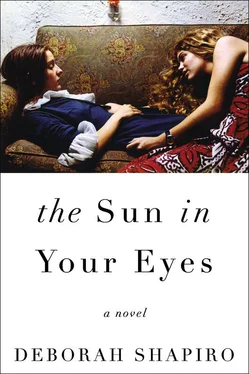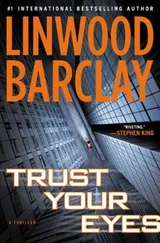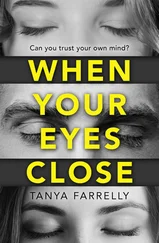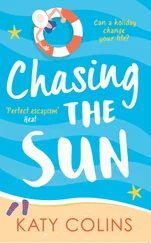“It wasn’t an accident, though. You walked out into the road.”
“I didn’t know what I was doing.”
“You always know what you’re doing.” One of Linda’s best and worst qualities, one that required, as Ellen Shelley might put it, a shit-ton of compartmentalization. Lee hadn’t inherited that ability to hold herself together by splitting herself apart. But clearly she was good at keeping her own secrets.
Lee had the urge to fling her empty glass across the room, followed by the pitcher and the tray, to upturn the coffee table, but she only stood and took her glass to the kitchen sink where she rinsed it, dried it, and put it away.
“Lee,” Linda called from the living room. “What are you doing?”
“I have to go,” she said. She stood in the hall, under the arch.
“Go where?”
That was the question. She thought of Viv, in a taxi back from JFK, in her fluorescent-lit lobby, taking the paint-coated elevator up to her graciously proportioned prewar apartment, slipping off her shoes and walking quietly down the hallway, pulling back the duvet and getting into bed with Andy, kissing the back of his neck, holding him close to her. Lee caught sight of the pink sofa and wondered why it had never occurred to her to buy one for her own place. When she’d moved back to New York, she thought her small one-bedroom in Gramercy might be temporary. But a designer she was friendly with, a French woman who wore only a limited color palette of black, white, and gray, offered to set up Lee’s place. She said it would be “sophisticated” and “classic” but still “lived in”—messy stacks of the right photography books—“and a little bit rocker.” Lee said that sounded fine. And it was fine. Fine like a trendy, upscale hotel.
“I don’t know where I’m going to go,” said Lee. “I can’t be here.”
Bony hands, sunken, fragile, swimming eyes. Linda was no longer the woman she had been even moments ago. The one who had, more or less, sat down and said, “Let me tell you how it is, little girl.” This woman couldn’t tell her anything. This woman couldn’t help her. This woman could only look on anxiously as her daughter walked out the door.
HE WAS TELLINGher a story he would later recount on a late night talk show, involving his six-year-old daughter and a canoe. This is why she had come here, because it was like watching TV. Hypnotic. She knew the sex with him would be the same way and it was. She hadn’t had to think or talk much, only smile when he told her how he missed the curve of her belly, grow wistful when he said he still thought about her all the time.
“When was the last time you saw your daughter?” she asked.
“A couple of months ago,” said Jack.
“You should go see her.”
“I know, but she’s in school, in New York, and I’m here right now. I’ll see her this summer.”
“Yeah, but you should go sooner. Because you never know.”
He didn’t do anything as obvious as wince, but she could see she was depressing him. Reminding him of other depressing women again — neither of them wanted that.
“Sorry,” she said. A deflated plastic lounge chair lay by the side of the pool at the house he had rented. Behind it rose a hedge wall of shiny deep green leaves. Hollyleaf cherry, she almost said aloud. The way she used to name the birds, sitting by the water with Viv and Andy. Instead, she pointed to the drooping lounger. “Hey, can you blow this up?”
“Sure. I’ll blow, you watch.”
It was a line from a movie he’d been in, delivered by an actress making the transition from child star to adult roles. She’d accomplished this rather successfully, too, the actress. So it was possible. But you almost always had to say things like that. Jack had been about ten years younger then, his face fuller, rosier, but he was aging well, looking weathered, leaner, more interesting, less like a puppy dog. What would his daughter think someday, maybe years from now, when she went back and watched his old movies? Would she think, My dad was so beautiful once ?
a memory you didn’t know you had Viv, 2012
The package arrived on a Saturday a few weeks ago, and went in a pile that Andy placed on the table in the front hall. We have a front hall now, with a narrow window running the length of the front door, throwing a rectangle of sunlight on the floor, on a pair of little shoes. We have a jacaranda tree shedding purple flowers in our yard. We have a yard. We have a son, who pulled the padded envelope down and said, “mail darf” as he struggled in vain to open it.
“Maildarf,” said Andy. “The parcel service of Middle Earth.”
“Dada,” said Leo, handing it to Andy.
“Can you take that over to Mama?” Andy asked. “Then I’ll take you to the park.”
“Mama,” said Leo.
On the front was my name written in Lee’s hand, with an Austin, Texas, postmark, no return address. It had been more than two years since I’d heard anything from her. When she came back to New York following the confrontation with her mother, we met up for dinner, though only after repeated attempts on my part to pin down a time and place. Already again, she was not quite contrite enough, and I was mildly aggrieved. But that disappeared when she showed up steadied by the kind of calm that a beta-blocking agent or benzodiazepine provides. That calm was reinforced over the course of the evening by several glasses of Malbec that I matched with mineral water. She told me what had happened with Linda. I asked what she was going to do. She’d already quit her job. There was no way she could keep working for her. No, I meant, was she going to go to the police? She didn’t think so. Marion never had. What good would it do anybody now, Linda serving out a sentence, if it even came to that? The law seemed so far removed from what had happened — inadequate in a sense. Lee wasn’t sure what was next. She thought she might travel for a while. Still, I thought. Still, after everything. To be someone who can just quit a job and go traveling with no fixed return. I envied her. That was as much as I knew.
The envelope contained a CD (“How old school,” said Andy.) and a note for me. I knew, of course, what it must be and passed the disc to Andy. But I kept the note in my hand, not wanting to open it just yet. Some instinct told me I ought to be alone to read it. Whatever it contained belonged only to me, or someone I used to be.
“Should we play it?” Andy asked.
“You guys are all ready to go. Let’s play it when you get back.”
“The suspense isn’t going to kill you?”
“I don’t know. Maybe it’ll be anticlimactic.”
“Yeah. After all this time.”
“But Flintwick always said it was really good. Music is the one thing you could trust him about. Marion also said it was great.”
I felt I should stop talking, that Lee and Linda and Jesse, the Parrish Wests, were like an ex that you could bring up every once in a while, just enough to stoke a healthy jealousy, but no more. I had to have my limits.
“You guys go. I really have to get this stuff done. So we’ll just listen to it tonight.”
“Okay. Don’t work too hard. We’ll see you later.”
I’m writing at all hours now for a new set of characters in a different town. Verona Crossing, Wisconsin, is located somewhere between Milwaukee and Chicago. Verona Crossing is populated with its own magnates, supermodels, law enforcement agents, restaurateurs, and a disgraced mayor currently having a second act as a highly regarded cocktail mixologist. When word of THATH’s cancellation had come, Frank received an offer to work for one of the remaining L.A. soaps and suggested I go with him. “There’s nothing for us here,” he said of New York, as though it were time to leave the barren farm and hop a boxcar to a Hooverville. We had all seen the end coming. Andy thought we should do it. Pick up stakes, start again. His prospects were fine (“They have the Internet there.”) and the change, he believed, would be good for us, for our family.
Читать дальше












